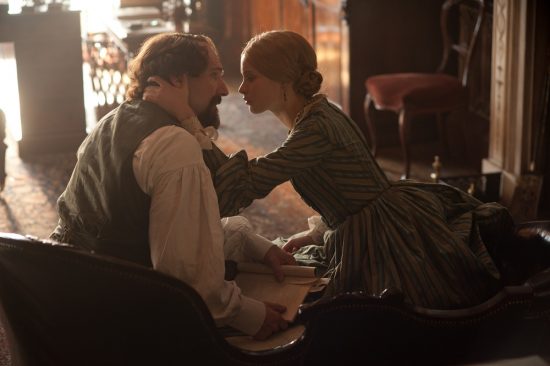How Fiennes is our first film feminist of 2014
Another period drama film written and directed by a luvvie thesp – give me a break?! If that’s your opinion on the release of The Invisible Woman then there probably isn’t much to change your mind.
This film falls within that genre that does well in Awards Season (which we’re so deeply entrenched within this month), but doesn’t score highly on the funometer. This review isn’t about to convince you otherwise, but that doesn’t mean there is not merit in this fine film about a true story rarely (if ever?) previously committed to celluloid.
Ralph Fiennes has created an interesting and enlightening production about the relationship between work, love and the role of women in history. What makes this film extra-special is its focus on the thought processes, feelings and civic duties of a real-life woman who was a catalyst for Charles Dickens‘ latter success. Those thinking that this story might be a tad out-of-touch will also find parallels between the past and today – showing that even when cultural opinion was not governed by the internet it was still every bit as judgemental as it is today.
Felicity Jones plays Nelly Ternan – a married mother and schoolteacher, who begins the film painfully haunted by her past. Her memories, provoked by remorse and guilt, leap back in time as the viewer is made aware of her clandestine relationship with Charles Dickens (Fiennes) when she was a young girl and how this shared exciting and fragile complicity led to tragic consequences.
Dickens – famous, controlling and emotionally isolated within his success – falls for Nelly, a mediocre acting talent in a thespian family. The theatre is a vital arena for Dickens – we was a brilliant amateur actor in his time, impressive for a man more emotionally coherent on the page than in his private life. As Nelly becomes the focus of Dickens’ passion, and their affair plays out, she must deal with Dickens’ public persona, his many children and his formidably calm wife.
And now for the feminism…
At first this looks like a Ralph Fiennes gig – Dickens’ leaps off the screen and his direction is assured. But look beyond the surface PR and this production subtly echoes female voices. The Invisible Woman has two shining central female characters in Nelly and Catherine Dickens (played so well by Joanna Scanlan), is based on a book from a female author (Claire Tomalin – written way back in 1991) and has been adapted by a female scriptwriter – Abi Morgan, famed for her brutal Shame script, as well as Birdsong, The Hour and the Oscar-winning The Iron Lady.
Jones is brilliant – in a rounded role requiring a metamorphosis from Victorian ingénue to woman of steel. However Joanna Scanlan was the real revelation – playing the long-suffering many-child-bearing wife Catherine, she conveys an intelligence of outlook and an understanding of privilege with an arch subtlety and moral conviction that I’ve rarely seen bettered. She should be nominated for a best supporting actress award, but this role is not showy enough for either the British or American awards academies.
Fiennes did not initially intend to play Charles Dickens, but after convincing from Morgan he’s a perfect incarnation of the man who could not stop telling stories. Even on its short filming schedule, a fantastic and truthful film has been revealed – keeping me riveted throughout. Let’s hope Fiennes continues to surprise us with his understanding of the multifaceted female mind, lord knows we need his influence on screen today.











